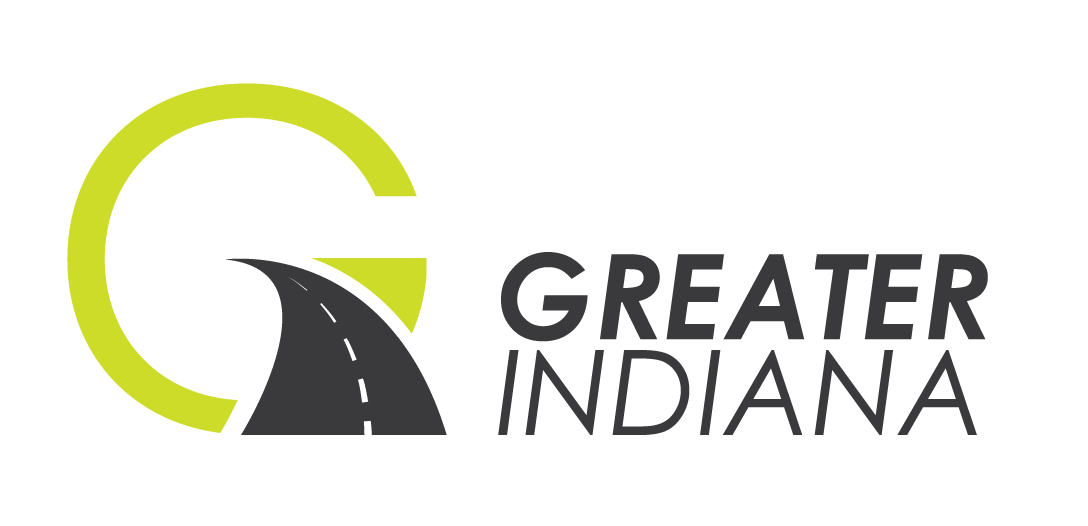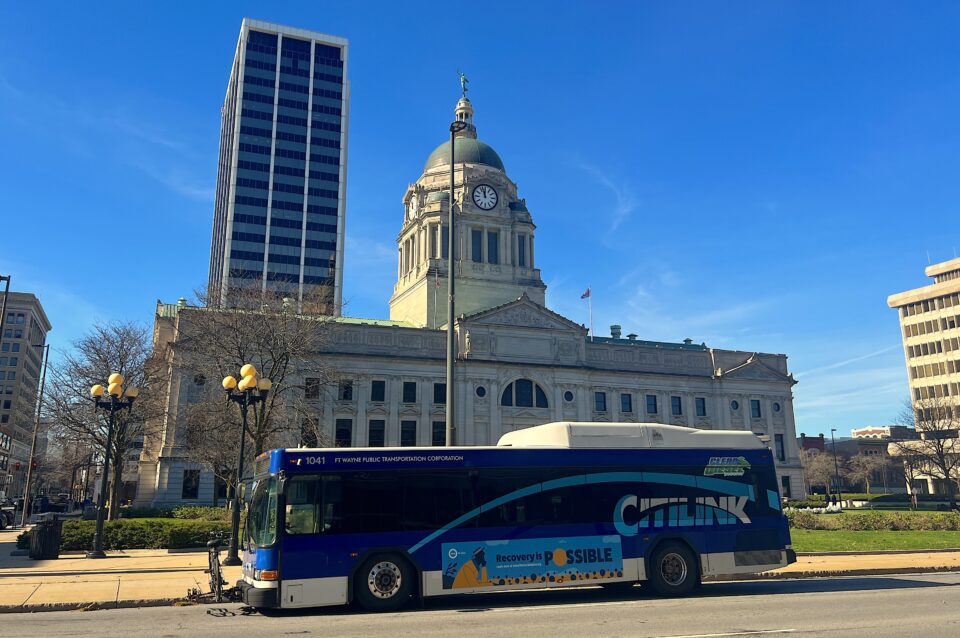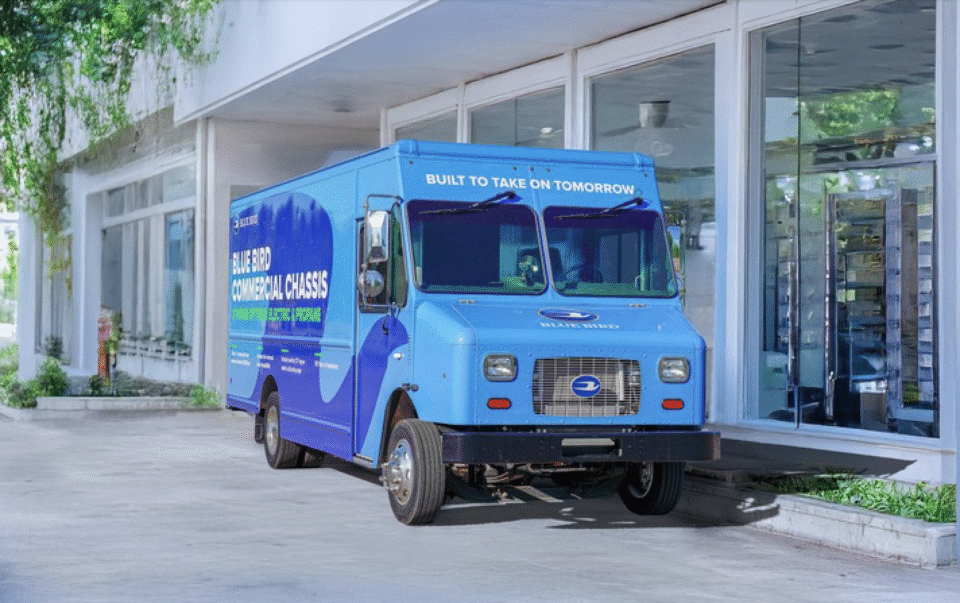State honors City of Fort Wayne, Indiana Soybean Alliance and six other organizations with the highest environmental award
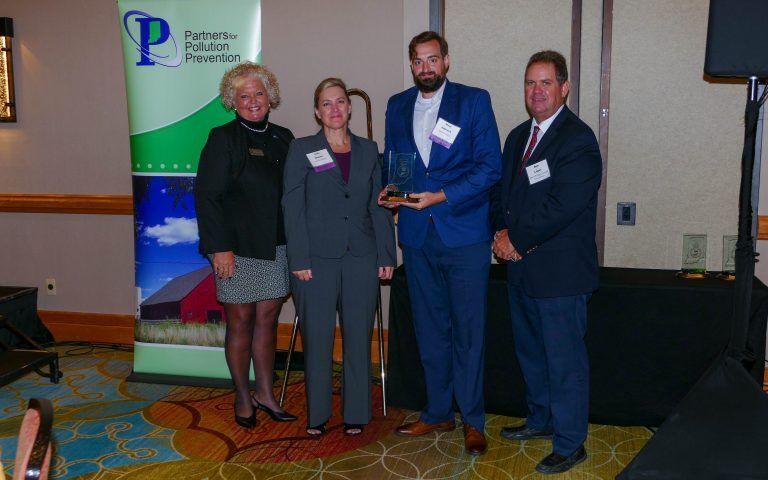
Indiana Department of Environmental Management (IDEM) presented the 2021 Governor’s Awards for Environmental Excellence to eight recipients who were honored for extraordinary initiatives in protecting the environment.
“We are excited to recognize our 2021 Governor’s Award winners for their efforts in innovation, waste reduction, and improvements to Indiana’s environment,” said IDEM Commissioner Bruno Pigott. “These award winners are paving the way for other organizations to learn how to increase environmental protection efforts in the state.”
IDEM Assistant Commissioner Julia Wickard presented the awards during the 24th annual Pollution Prevention Conference and Tradeshow held last week at the Marriott North in Indianapolis.
2021 categories and winners:
Greening the Government:
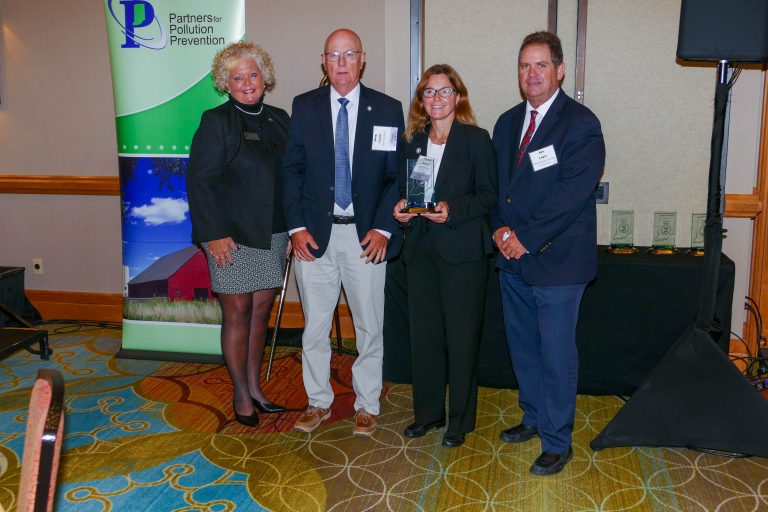
Pictured (left-to-right): Julia Wickard, Assistant Commissioner, Office of Program Support, IDEM; Doug Fasick, Engineering Manager, Fort Wayne City Utilities; Patricia Carney, Program Manager, Fort Wayne City Utilities; Bob Lugar, Deputy Assistant Commissioner, Office of Program Support, IDEM
Fort Wayne City Utilities, Fort Wayne for “The City Utilities Energy Plan”
The utilities department developed a comprehensive energy policy that has prevented pollution and reduced costs for the city. The Energy Policy uses the ISO-50001 process and the U.S. Department of Energy’s Energy Performance Intensity tool as a blueprint, while also implementing the Plan-Do-Check-Act management system that focuses on continual improvement. The Energy Plan implemented important initiatives that included greening their fleet, converting to energy-efficient lighting and HVAC, completing a greenhouse gas inventory, and implementing a combined heat and power system. Since adopting this policy, the combined heat and power system has resulted in a 27.2 megawatt hour reduction of electricity purchased from the local utility which equates to a 30 percent reduction. The fleet initiative has prevented the release of 90 pounds of particulate matter, 154 pounds of hydrocarbons, 492 pounds of carbon monoxide, and 966,400 pounds of carbon dioxide per year.
Pollution Prevention:
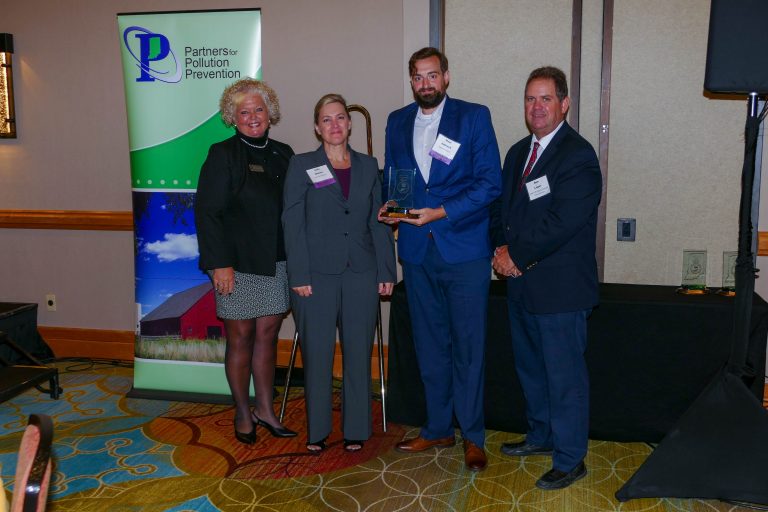
Pictured (left-to-right): Julia Wickard, Assistant Commissioner, Office of Program Support, IDEM; Julie Ohmen, New Uses Consultant, Indiana Soybean Alliance; Paul Imbrock, Technical Lead, PoreShield; Bob Lugar, Deputy Assistant Commissioner, Office of Program Support, IDEM
The Indiana Soybean Alliance, Indianapolis for “Development of Soy-Based Concrete Durability Enhancer PoreShield”
The Soybean Alliance is a statewide organization that serves Hoosier soybean farmers. The Soybean Alliance funded research at Purdue University in partnership with the Indiana Department of Transportation to develop a soy-based concrete durability enhancer called PoreShield. PoreShield, made with soy methyl soyate, can replace traditional toxic concrete protectors and sealants. PoreShield is a biobased alternative to traditional concrete protectors such as petroleum-based fillers for joints or silane-based treatments for surfaces. PoreShield reduces volatile organic compound air emissions by 90 percent and eliminates the need for harmful solvents used for cleanup of traditional concrete enhancers. The development of this bio-based technology also supports Hoosier soybean farmers across the state.
Environmental Outreach/Education:
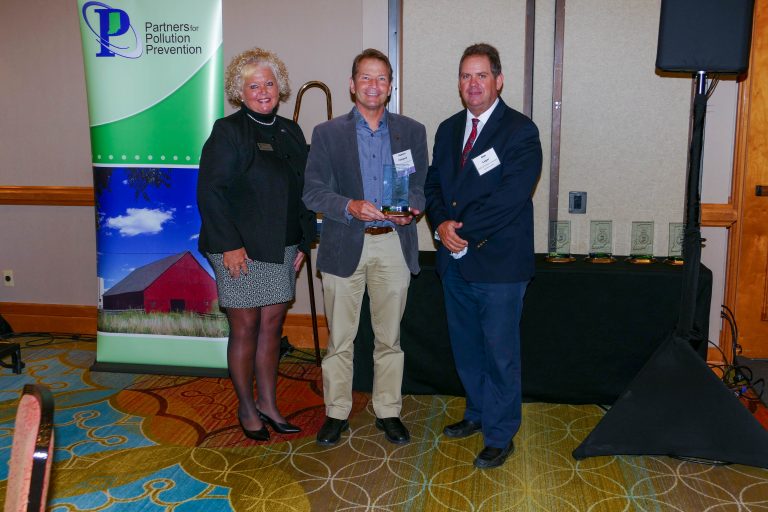
Pictured (left-to-right): Julia Wickard, Assistant Commissioner, Office of Program Support, IDEM; Dr. Gabriel Filippelli, Executive Director, Environmental Resilience Institute, Indiana University; Bob Lugar, Deputy Assistant Commissioner, Office of Program Support, IDEM
Environmental Resilience Institute at Indiana University, Bloomington for “Local Government Implementation Portfolio”
The Environmental Resilience Institute (ERI) is a university-wide institute assisting communities throughout the state to adapt and thrive amid environmental change. ERI’s implementation portfolio provides outreach, education, tools, training, research, and support for local governments throughout the Hoosier state. ERI’s local government implementation portfolio is highlighted by four key elements. First, the ERI toolkit, an interactive resource that connects local officials to information on climate change implications, funding opportunities, and community projects. Second, the Hoosier Resilience Index which provides community specific data. Third, the free monthly Prepared for Environmental Change Webinar Series. Fourth, resilience cohorts lead local units of government through the process of conducting greenhouse gas inventories and developing climate action plans. To date, 17 governments have completed community-scale greenhouse gas inventories and 13 have completed, or are working on, climate action plans.
Energy Efficiency/Renewable Resources:
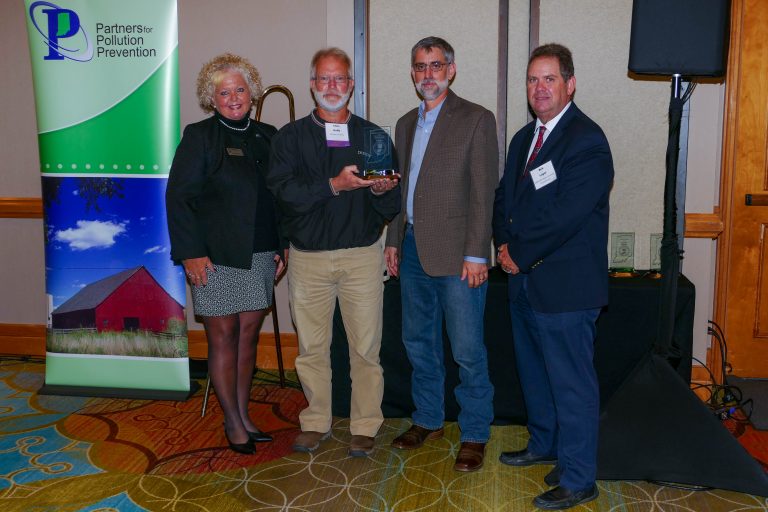
Pictured (left-to-right): Julia Wickard, Assistant Commissioner, Office of Program Support, IDEM; Chris Hoffa, Director of Systems Operations, DePauw University; Warren Whitesell, Associate Vice President of Facilities Management, DePauw University; Bob Lugar, Deputy Assistant Commissioner, Office of Program Support, IDEM
DePauw University, Greencastle for “Campus Energy Master Plan”
After signing the American Colleges and Universities Presidents’ Climate Commitment, DePauw University decided to develop their Campus Energy Master Plan to reduce greenhouse gas emissions. The University formally launched the plan in 2017 and completed it in 2020. It consists of five major elements: establishing a district energy system, converting campus lighting to LED, optimizing the HVAC systems, installing low flow water fixtures, and building a 240-kilowatt solar array. DePauw’s Campus Energy Master Plan is guaranteed to achieve at least a 25 percent reduction of energy use on campus over the next three years. The solar array is grid-tied and expected to produce 1,092,333 kilowatt hours per year which results in a greenhouse gas reduction of 224 metric tons of carbon dioxide equivalents. Due to reduced energy expenditures, the energy plan is expected to save the university $780,000 per year.
Five Year Continuous Improvement:
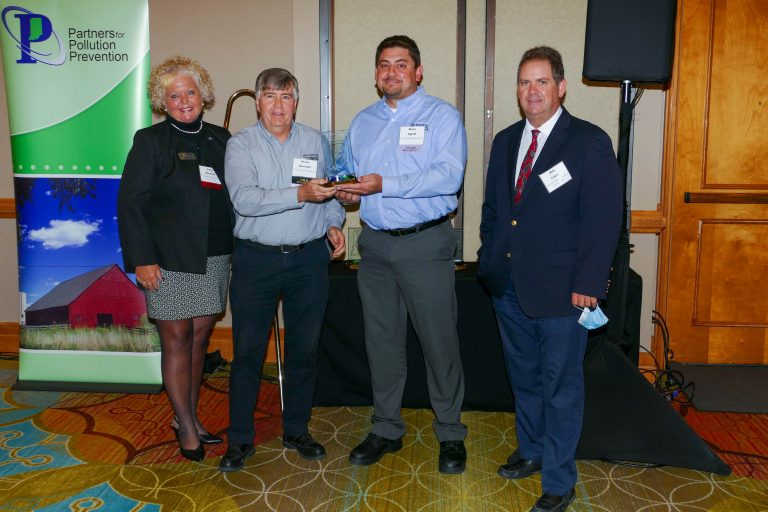
Pictured (left-to-right): Julia Wickard, Assistant Commissioner, Office of Program Support, IDEM; Dixon Churchill, Environmental Health & Safety Supervisor, Toyota Material Handling, Inc.; Brian Egloff, Director of Operations, Toyota Material Handling, Inc.; Bob Lugar; Deputy Assistant Commissioner, Office of Program Support, IDEM
Toyota Material handling, Inc., Columbus for “Carbon Dioxide (CO2) Reduction Projects”
As part of their Environmental Management System, Toyota Material Handling implemented seven environmentally beneficial projects that reduced emissions and improved operational efficiency. These include conversion to LED lighting, installation of radiant dock heaters, air leak and compressor improvements, installation of power and gas monitoring systems, installation of 18 weld fume collection systems, and investment in wind energy certificates. Since the baseline year of 2018, Toyota’s CO2 reduction projects resulted in a 22 percent reduction in electricity consumption, 23 percent reduction in natural gas consumption, and 37 percent reduction in CO2 emissions.
Land Use/Conservation:
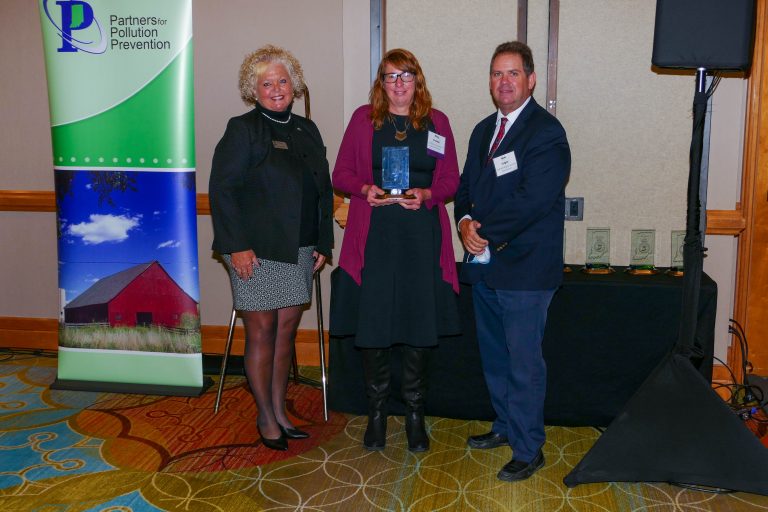
Pictured (left-to-right): Julia Wickard, Assistant Commissioner, Office of Program Support, IDEM; Mary Franke, Director, LaGrange County Department of Parks & Recreation; Bob Lugar, Deputy Assistant Commissioner, Office of Program Support, IDEM
The LaGrange County Department of Parks and Recreation, Wolcottville for “Duff Fen Restoration Project”
The Parks and Recreation Department acquired Duff Lake Fen in 2 parcels: 108 acres in 2013, and 21 acres in 2016, to bring the total acreage of Pine Knob Park up to 254 acres. The motivational intent with the Duff Lake Fen/Savanna Restoration project was to hydrologically and vegetatively restore approximately 182 acres of the property, and the adjoining Pine Knob Park property, into a native grassland. Prior to acquisition, the property was in agricultural use as cattle pasture, hay, and row crops. The restoration included two years of invasive removal, a $944,400 investment, 182 acres restored to native savanna, and 36 endangered, threatened, and rare species protected.
Recycle/Reuse:
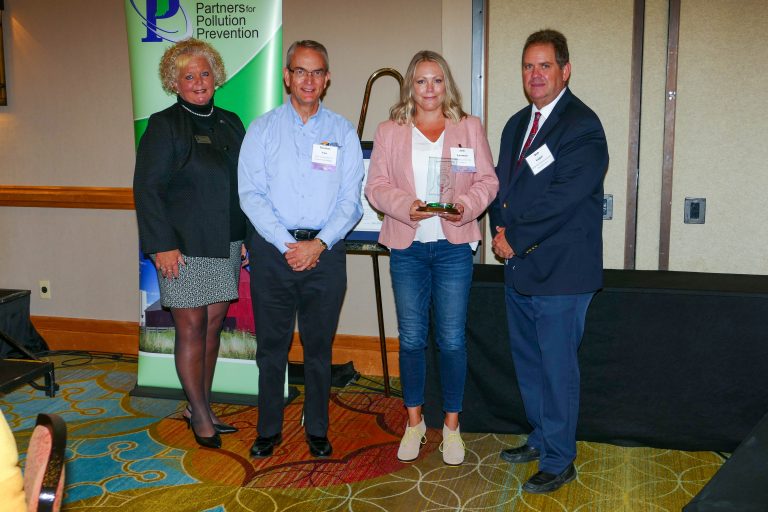
Pictured (left-to-right): Julia Wickard, Assistant Commissioner, Office of Program Support, IDEM; Tom Fox, Director, Allen County Department of Environmental Management; Jodi Leamon, Site Director, Food Rescue US- Fort Wayne Chapter; Bob Lugar, Deputy Assistant Commissioner, Office of Program Support, IDEM
Food Rescue US-Fort Wayne Chapter and the Allen County Department of Environmental Management for “Food Waste Reduction Program”
Food Rescue US-Fort Wayne Chapter and the Allen County Department of Environmental Management partnered to divert food waste from the landfill. Excess food is collected from various donor restaurants and grocery stores and provided for those in need. Web-based software is used to create “rescues” when organizations have excess food. From there, volunteers pick up the food and deliver it to an approved food relief organization. In 2020, 53,220 meals were diverted from the landfill and provided to those in need throughout Fort Wayne and Allen County. These meals came from 20 donors, picked up by one of the 76 volunteers, and delivered to one of the 23 registered recipients.
Recycle/Reuse:
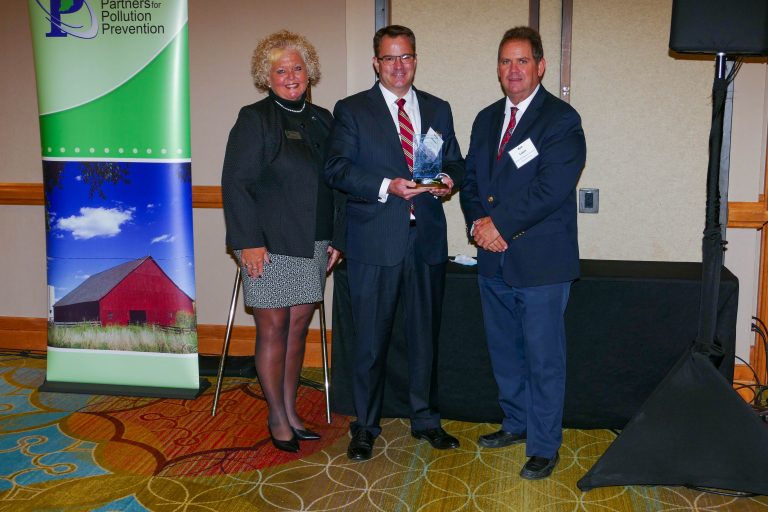
Pictured (left-to-right): Julia Wickard, Assistant Commissioner, Office of Program Support, IDEM; Wade Conner, Co-Founder & CEO, Trinity Metals; Bob Lugar, Deputy Assistant Commissioner, Office of Program Support, IDEM
Trinity Metals, Indianapolis for “Low-Grade Magnesium Recycling Method and System”
Trinity Metals, a company that specializes in processing non-ferrous and ferrous metals, specialty metals, and e-scrap for recycling and reuse, implemented a new and innovative recycling method for mid- and low-grade magnesium scrap. In 2008, the company began researching a new recycling method for processing mid and low-grade magnesium scrap. At the end of 2019, the process was finalized and is now capable of recycling most grades of solid magnesium scrap. Trinity Metals’ patented recycling method uses customized industrial equipment to minimize and mitigate the risk of fire, while also removing and containing contaminates when cleaning mid and low-grade magnesium. This is done by washing the magnesium scrap in a controlled environment that contains all elements of the cleaning process. The controlled environment, or housing unit, contains the magnesium in a temperature-controlled setting that isolates the magnesium from the surrounding environment and prevents any of the contaminants removed from the magnesium from being discharged.
The Governor’s Awards for Environmental Excellence is an annual program to recognize Indiana’s leaders who have identified and implemented innovative environmental practices into their programs and facilities. The awards program is open to all Indiana facilities, state and local units of government, individuals, and technical assistance organizations that implement exemplary environmental projects with measurable results.
For more information about the Governor’s Awards for Environmental Excellence, visit www.in.gov/idem/partnerships/governors-awards-for-environmental-excellence/. Nomination forms will be available soon for the 2022 Governor’s Awards for Environmental Excellence. Organizations, businesses, and individuals will have until April 2022 to submit nominations for projects completed in 2020 and 2021.
About IDEM
IDEM (idem.IN.gov) implements federal and state regulations regarding the environment. Through compliance assistance, incentive programs, and educational outreach, the agency encourages and aids businesses and citizens in protecting Hoosiers and our environment.

